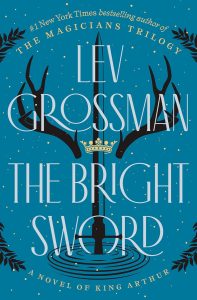Ian Mond Reviews The Bright Sword by Lev Grossman
 The Bright Sword, Lev Grossman (Viking 978-0-73522-404-9, $35.00, 688pp, hc) June 2024.
The Bright Sword, Lev Grossman (Viking 978-0-73522-404-9, $35.00, 688pp, hc) June 2024.
In a “Historical Note” to his new novel The Bright Sword (his first adult novel since wrapping up The Magicians trilogy), Lev Grossman remarks that people have been re-working and re-inventing King Arthur’s story for nearly 1,400 years. As he poetically puts it, the legend has “never been told quite the same way twice. Every age and every teller leaves traces on the story, and as it passes from one hand to the next, it evolves and changes and flows like water.” This is no truer than in the last century where, with the emergence of genre fiction in America and Europe, Arthur’s tale has gone through countless re-tellings – to the degree it can be viewed as the foundational text of multiple Western epic quest fantasies. In more recent years, authors have started questioning and probing the underlying assumptions of the broader narrative. In 2020, I reviewed Lavie Tidhar’s magnificent By Force Alone, a radical retelling of the myth – with a kung-fu Lancelot and a gangster Arthur – that sought to address the prevailing but inaccurate belief that King Arthur is uniquely British. In the same year, Tracy Deonn, with the publication of Legendborn, set Arthur’s tale in North Carolina, using the experience of a “Black teenage girl in the South to interrogate and refresh King Arthur and the legends, both in her world and ours.” (Deonn also penned an excellent piece for Reactor – “Every King Arthur Retelling Is Fanfic About Who Gets to Be Legendary” – where she categorises Arthuriana as fanfic thereby creating a shared narrative and “[loosening] the grip of ownership that the myth of a single story perpetuates.”) This brings us back to Lev Grossman, who, in the vein of Tidhar and Deonn and so many other authors I have failed to mention, takes this most malleable of narratives and revels in its many contradictions and anachronisms while also celebrating the importance of change, whether it be societal or demographic.
Our unlikely hero is seventeen-year-old Collum, a resident of the remote island of Mull in Caledonia (though we now call it Scotland – or the section of Scotland north of the River Forth). Collum is described as “tall, ungodly strong, virtually ambidextrous, and terrifyingly quick on his feet, with the shoulders of a stevedore and the delicate hands of a goldsmith.” He’s the best fighter on the island, though, as we’re pithily told, this is no remarkable feat given Mull “wasn’t exactly a hotbed of world-class knightly talent.” With dreams of Camelot and very little keeping him home, he heads off to Caerleon, where he hopes to take a seat at the fabled Round Table alongside King Arthur and his one hundred knights. Along the way, Collum has a disturbing encounter with a knight. In fact, this is where we first meet the teenager, getting punched in the face with the pommel of a sword by a much larger man. Collum ultimately bests his opponent, but rather than yield, the wounded knight (having said rude things about Collum’s mother) attacks, forcing Collum to end the man’s life. While not a great start, Collum continues his journey to Camelot, passing through a “dog’s breakfast of northern realms” dotted with the ruins of the Roman Empire, finally arriving at Arthur’s palace, where he will need to fib a little to join the Round Table (Collum is not of noble blood). But on entering the Great Hall, Collum is horrified to discover that he’s come too late. King Arthur is dead at the hands of his son Mordred at Camlann, and all that remains of the Round Table is a literal handful of bedraggled knights. With little chance of finding a suitable King, the Age of Camelot is over.
The Bright Sword is not a short novel, but unless you purchase a physical copy, you won’t notice its girth. This is storytelling at its purest: glorious, propulsive, and dramatic. Drawing on every aspect of the Arthurian mythos (and more besides), Grossman presents us with fairies, giants, gods, angels, spellcasters, and elemental forces. The magical battles and the sword fights are all imbued with a cinematic quality while still maintaining a sense of the real, of metal parting flesh, of death and bone-crunching violence. Between the action, there are plenty of bawdy jokes and witty banter – every novel should have a Sir Dinadan in their cast – and genuine moments of emotional insight. In leaning into the fictive (or “fan fiction”) aspects of the Arthurian legend, Grossman picks and chooses his sources (fans of Arthuriana will have a field day uncovering each reference) and deliberately peppers the story with anachronisms, not least of which is the fact that Sir Palomides – one of the surviving knights of the Round Table – is from Baghdad, a city that did not exist in the 5th Century (when the story of King Arthur is alleged to take place).
But there’s more to enjoy about The Bright Sword than the storytelling or Grossman’s playful attitude to the material. In a provocative but brilliant move, Grossman takes these larger-than-life characters and presents them as “outsiders” (each surviving knight gets their own tale). Sir Bedivere is gay. Sir Dinadan is a trans man (props to Grossman for subverting the story of Lancelot forcing Dinadan into a dress), Sir Palomides is a person of colour and a Muslim (though he does convert to Christianity), and Sir Dagonet suffers from anxiety and depression. In opening the Arthurian legend to other forms of representation, Grossman recasts the narrative as a story about change. It’s while questing for a new King to replace Arthur (if not Arthur himself…with swirling rumours he survived his tussle with Mordred) that Collum gradually comes to realise that the Britain he understood is no more, no longer a homogenous culture (if it ever was), but a diverse place populated by Romans, Picts, Angles, and the like. This is reinforced towards the novel’s end when the knights witness thousands of Saxons arriving on Britain’s shores. What they first believe are invaders are, in actuality, climate refugees fleeing a flooded country. And it’s from these immigrants, seeking safety, seeking a new life for their children, that the England we know now is formed. It’s a powerful scene, one that reminds us that no culture exists in a vacuum, but also that no matter how many bills are signed into law – such as the one in the UK that will see asylum seekers deported to Rwanda – people, faced with violence and the growing effects of climate change, will, just like the Saxons, seek a better life elsewhere.
Ian Mond loves to talk about books. For eight years he co-hosted a book podcast, The Writer and the Critic, with Kirstyn McDermott. Recently he has revived his blog, The Hysterical Hamster, and is again posting mostly vulgar reviews on an eclectic range of literary and genre novels. You can also follow Ian on Twitter (@Mondyboy) or contact him at mondyboy74@gmail.com.
This review and more like it in the June 2024 issue of Locus.
 While you are here, please take a moment to support Locus with a one-time or recurring donation. We rely on reader donations to keep the magazine and site going, and would like to keep the site paywall free, but WE NEED YOUR FINANCIAL SUPPORT to continue quality coverage of the science fiction and fantasy field.
While you are here, please take a moment to support Locus with a one-time or recurring donation. We rely on reader donations to keep the magazine and site going, and would like to keep the site paywall free, but WE NEED YOUR FINANCIAL SUPPORT to continue quality coverage of the science fiction and fantasy field.
©Locus Magazine. Copyrighted material may not be republished without permission of LSFF.







